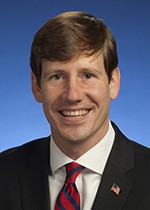Representative Butt. I love saying that out loud in my best Cartman voice from South Park. It would be a great name for a band. Unfortunately, it’s the name of one Sheila Butt, a Republican Tennessee lawmaker who recently posted on Facebook that she thinks there should be an “NAAWP.” This was in response to an open letter from the Council on American-Islamic Relations, the largest Muslim civil liberties organization in the United States, urging 2016 GOP candidates to engage Muslim voters and reject Islamophobia. Now, you might automatically assume that the W in her imaginary dream organization stands for “white,” just like it did years ago when former Ku Klux Klan leader David Duke actually founded a group named NAAWP. But Butt, who at first wouldn’t even offer an explanation of the post, eventually stated publicly that that was not the case. She said it stood for “National Association for the Advancement of Western Peoples.”

Sheila Butt
Is she talking about Californians? Cowboys? Or is she trying to say we need to advance Western people, like real Americans versus Asian and Middle Eastern people? She obviously thinks the latter is acceptable. That has been her “go to” response as she explains her remarks while basically running down hallways from reporters and pretending to be talking on her cell phone. She shoos them away by acting like she’s too busy to talk with them and too in demand and too important to comment on this issue that she thinks liberals have jumped on because Christians don’t get a fair shake in the good ol’ U.S. of A. and that the liberal media is just making a story out of nothing.
But she pretty swiftly took down the Facebook post. It wasn’t even on her own page, but on the page of a Muslim-hating organization called dailyrollcall.com, which, if you’ve never seen, you simply must. A Tennessee woman named Cathy Hinners writes it, and it is really, really something. She’s like a dog with rabies and a computer. I had never heard of it, so I took a look when the issue of us needing an NAAWP came up. I don’t know where this woman came from (by that I mean, which planet), but she is apparently so obsessed with being anti-Muslim that she has dedicated her entire life to it. But I digress.
Once Butt got the Facebook post down, she replaced it with, “We need groups that will stand for Christians and our Western culture. We don’t have groups dedicated to speaking on our behalf.”
Really? Have you looked around at your own political party and its Tea Party offshoot? And what makes you think all people living in “Western culture” are Christians? Do you also have something against Jews?
One of the things I’m fascinated with regarding this entire issue is the school of thought that if there is a National Association for the Advancement of Colored People, why would it be racist for there to be a National Association for the Advancement of White People?
The last time I checked, not all that many white people were captured on a different continents, packed into ships like animals, separated from their families, paraded around naked in front of crowds, bought, sold, traded, beaten, forced to drink from separate water fountains, denied the right to vote, denied education, and other basic human rights. Of course, there needed to be, and still needs to be, an NAACP. And there is no need for an NAAWP — whether the “W” stands for white or western. There’s no way Representative Butt or anyone else can make that notion make sense.
There are still cities in this country where high schools have separate proms for white students and black students. To this day, there are country clubs right here in Memphis, Tennessee, that do not allow any members other than white people. They hide behind that mask of it being a “private club,” and, yes, in the year 2015, will not allow an African American, Asian, or Jewish person to have a membership. Representative Butt, I think they may just be standing up for your Christian/Western values, so you might have a little less to worry about than you think.
When are people going to learn a) that if you are an elected official, you are under a microscope and anything you say publicly is fair game for the kind of controversy you’ve stirred up? This is not the liberal media trying to make a story out of nothing; and b) that you don’t need to be posting this kind of crap on social media.
Social media posts never go away. You can remove your heinous comments once you get caught, but that doesn’t matter. There’s a little thing called copy and paste and those comments are out there forever. If you have any spine at all, just own up to the blunder and apologize — unless, that is, you still don’t think you did anything wrong, which I suspect is the case. And it looks like you have plenty of Butt fans in your party enough, at least, that they are going to, er, back you.

 JB
JB 





